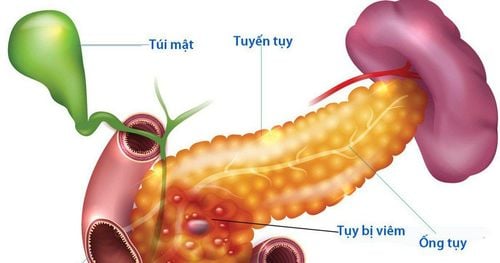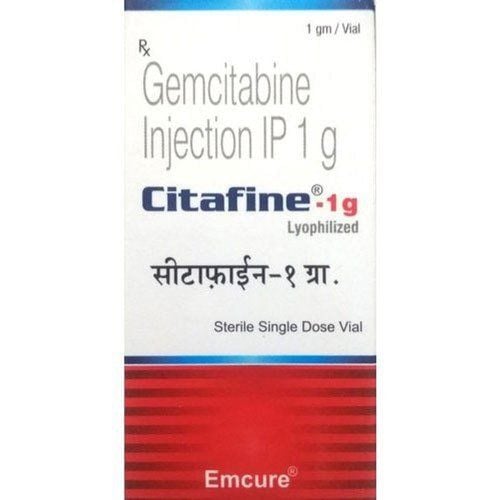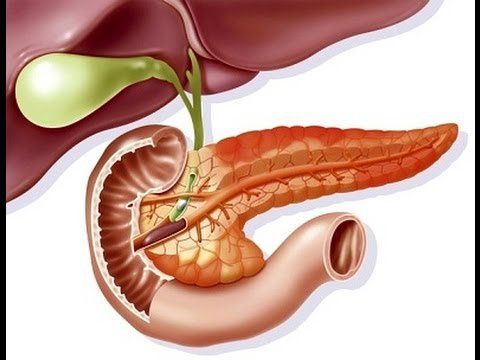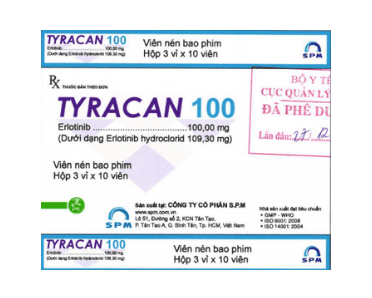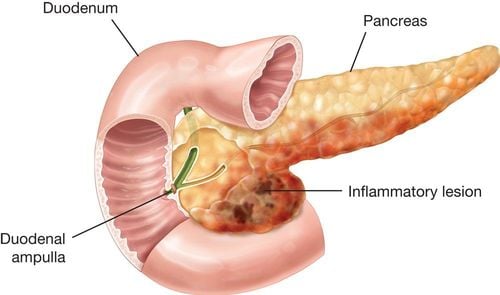This is an automatically translated article.
The article is professionally consulted by Specialist Doctor I Dong Xuan Ha - Department of Medical Examination and Internal Medicine - Vinmec Ha Long International Hospital.
Acute pancreatitis is an acute medical disease, severe, rapid progression and life-threatening if not treated promptly. There are many causes of acute pancreatitis, the most common of which are stones and alcohol. However, if you do not actively find the cause and prevent it, pancreatitis will recur many times and cause health decline. Here are the factors that explain the cause of acute pancreatitis.
1. Mechanical blockage
According to the anatomical structure, the bile duct and the pancreatic duct carrying digestive enzymes will go together before emptying into the duodenum. Accordingly, any mechanical obstruction that occurs in this pathway can cause accumulation of pancreatic juice and cause acute pancreatitis.The most common cause of obstruction is gallstones. Stones can form in the bile duct system from within the liver or in the lumen of the gallbladder. When bile is secreted for digestion, the stone travels down the bile duct and presses on the common bile duct, causing stagnation of both bile and pancreatic juice. Therefore, many observations have shown that patients after cholecystectomy have a reduced risk of acute pancreatitis.
Not only that, bile sludge - although it is only a viscous residue and can contain very small stones, can cause cholestasis, so it is also suspected as the cause of acute pancreatitis, especially in cases of acute pancreatitis. with transient elevation of liver enzymes.
Acute pancreatitis also occurs with other causes of bile duct obstruction such as cholangitis, bile duct diverticulum, benign or malignant tumor in the head of the pancreas...
2. Alcohol
Alcohol is the cause of acute pancreatitis in one-third of patients. Even, alcohol also causes the disease to progress to chronic pancreatitis or recurrent episodes of acute inflammation, making the body malnourished due to the inability to absorb food, and finally exhaustion.Until now, scientists were still unclear why alcohol causes acute pancreatitis only after many years of alcohol abuse, rather than after a sudden hangover in people who are not used to drinking. Accordingly, a number of hypotheses have been proposed that alcohol increases the sensitivity of pancreatic cells, easily activates inflammatory responses as well as promotes toxin formation, creating favorable conditions for pancreatic cancer. Potential viral agents easily penetrate and cause disease.
3. Tobacco
The cause of this acute pancreatitis has only been discovered in a later age besides the "classic" causes mentioned above. The evidence is that a series of studies have shown a fairly strong causal relationship with smoking habits in patients with acute pancreatitis.However, similar to alcohol consumption, the pathogenic mechanism of tobacco has not been clearly established.
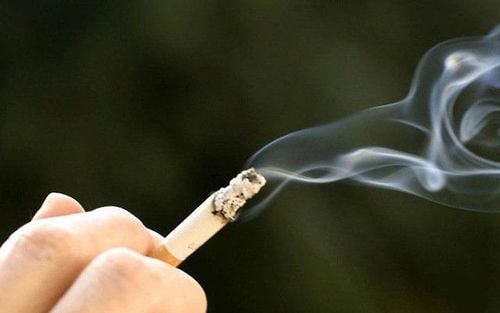
4. Endoscopic retrograde cholangiopancreatography ERCP
ERCP is endoscopic retrograde cholangiopancreatography (endoscopic retrograde cholangiopancreatography).Acute pancreatitis is one of the important complications following this procedure, with rates ranging from 3 to 25%, depending on the purpose of ERCP diagnosis or treatment. Accordingly, it is necessary to diagnose acute pancreatitis after performing ERCP in the case of a patient with persistent severe upper abdominal pain with associated nausea, vomiting, and hyperglycemia.
5. Increased triglycerides
When serum triglyceride levels are too high, a milky milky color on the top of the blood cells in the test tube is a risk factor for the onset of attacks of acute pancreatitis. Although the pathogenesis of the inflammatory response in the setting of hypertriglyceridemia is unclear, it has been reported to account for 1-4% of cases of acute pancreatitis.Severe hypertriglyceridemia is seen in children with genetic disorders of lipoprotein metabolism, subjects with obesity, diabetes, hypothyroidism, pregnancy, nephrotic syndrome, artificial hormone use...
6. Hypercalcemia
Although hypercalcemia is not a common cause of acute pancreatitis, it should not be overlooked because of the potential for treatment bias.Any mechanism of hypercalcaemia can lead to acute pancreatitis. This factor increases calcium deposition in the pancreatic duct and activates enzymes in the pancreatic parenchyma, easily triggering an inflammatory response.
7. Heredity
Heredity is also a factor observed in patients with acute pancreatitis. Changes in gene sequences or chromosomal mutations make an individual more susceptible to triggering an inflammatory response than the average person.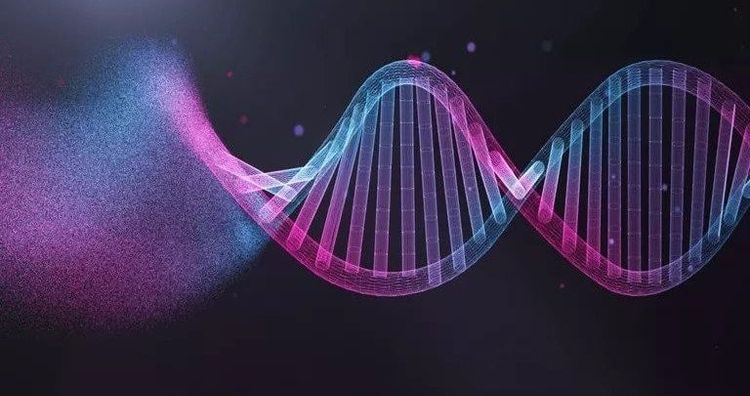
8. Drugs
Drug-induced acute pancreatitis is rare, but is currently increasing due to drug abuse.Some drugs that have been observed to be associated with pancreatitis are diuretics, sulfonamides, valproic acid, didanosine, pentamidine, tetracycline, 6-mercaptopurine, aminosalicylates, estrogens, steroids. The mechanism of drugs causing pancreatitis is direct toxicity to pancreatic cells, creating immune reactions, forming thrombus in blood vessels or increasing the viscosity of pancreatic juice, causing stagnation.
9. Infections and Toxins
The presence of bacterial strains and toxins in the body that reach the pancreatic parenchyma can cause acute-onset pancreatitis. Viruses and toxins can be listed:Viruses: mumps, coxsackievirus, hepatitis B, cytomegalovirus, varicella-zoster, herpes simplex, HIV. Bacteria: Mycoplasma, Legionella, Leptospira, Salmonella Fungi: Aspergillus Parasites: Toxoplasma, Cryptosporidium, Ascaris Toxicity: Venom of some spiders, reptiles...
10. Injuries
External trauma or direct injury to the pancreas disrupts the structure of the cells, releasing pancreatic juice, causing not only acute pancreatitis but also damage to surrounding organs, and peritonitis.Because the pancreas is located discreetly behind the peritoneum, any trauma affecting the pancreas is often severe and difficult to treat. Urgent surgery is always required to stop bleeding, preserve organs, clean the abdomen as well as save lives.
11. Pancreas split in two
This is an anatomical anomaly during fetal life that causes the pancreas not to merge, but to form two separate pancreases with independent excretory ducts.However, this finding is known only at autopsy and the mechanism of pancreatitis is also unknown.
12. Vascular disease
Like other organs, the pancreas is also nourished by a system of blood vessels. Therefore, any vascular disease can affect pancreatic function.Among them, pancreatic ischemia is a rare cause of acute pancreatitis but is of great clinical significance. This scenario occurs in cases of systemic lupus erythematosus vasculitis, perioperative hypotension, and hemorrhagic shock.
13. Pregnancy
Pregnancy is also a very rare cause of acute pancreatitis. It is hypothesized that endocrine and metabolic disorders during pregnancy increase the likelihood of gallstone formation, hyperlipidemia and other factors that increase pancreatic parenchymal sensitivity.However, pancreatitis in pregnant women is observed to be largely uncomplicated, the outcome on the fetus is quite good, although the risk of preterm birth is much higher than in other women.
14. Other causes
Some other very rare causes of recurrent pancreatitis are celiac disease, where duodenitis and biliary papillary stenosis are thought to be mechanisms of pancreatitis. Autoimmune pancreatitis can sometimes lead to acute pancreatitis with weight loss, jaundice, and pancreatic duct dilation. Finally, there are few reports of pancreatitis occurring in patients with psychogenic anorexia.15. Idiopathic
When the above causes are actively sought but cannot be explained, it is considered as acute idiopathic pancreatitis.With the support of advanced imaging facilities such as conventional magnetic resonance imaging, biliary magnetic resonance imaging, transendoscopic ultrasound, endoscopic retrograde cholangiopancreatography, up to 15-25% of patients Patients with acute pancreatitis were concluded to be idiopathic.
In short, the causes leading to acute pancreatitis are extremely diverse and there are also many potential factors. We need to improve our understanding of acute pancreatitis so that we can proactively prevent and think about this diagnosis at the very first manifestation.
With 14 years of experience in the field of Endoscopy - Gastroenterology, Doctor Dong Xuan Ha proficiently performs diagnostic gastrointestinal endoscopy techniques, emergency interventions and therapeutic interventions. Currently, he is a gastroenterologist at the Department of General Internal Medicine, Vinmec Ha Long International General Hospital.
Please dial HOTLINE for more information or register for an appointment HERE. Download MyVinmec app to make appointments faster and to manage your bookings easily.





